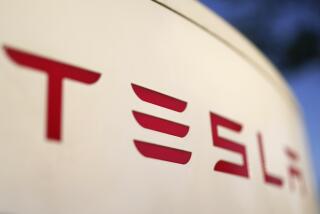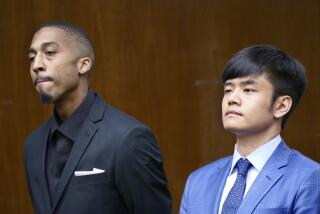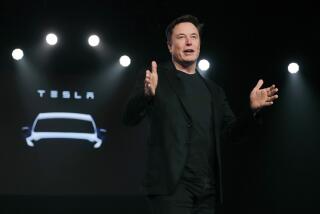Hyundai Hit With Verdict of $15 Million : Courts: A jury holds the Korean auto maker liable for brain damage suffered by a boy wearing a seat belt of defective design in a 1988 Excel.
- Share via
NORWALK — A 12-year-old Lakewood boy who suffered permanent brain damage in a traffic accident won a $15-million verdict Monday from a jury that concluded that his injuries resulted in part from a defective seat belt design in 1988 Hyundai Excels.
The Los Angeles Superior court jury, which deliberated seven days, ruled that Fountain Valley-based Hyundai Motor America Inc. and its parent company in Korea were responsible for the injuries to Adam Ketchum, even though the seat belt met federal safety standards.
The jury, in a 9-3 ruling, decided that Hyundai’s “two-point” seat belt system was defective and that the company failed to warn consumers of the potential dangers the belts posed to children, according to Ketchum’s attorney, Mark P. Robinson Jr.
Robinson said the two-point seat belt systems have no lap restraint and can choke the necks of children in automobile accidents. Without a lap belt, the child’s hips and head are flung forward, and the chest belt then is forced up against the neck. In Ketchum’s case, the belt compressed against his neck, causing him to be brain damaged, blind, mute and paralyzed. Further, Robinson contended, the lack of the lap belt allowed the boy to hit his head on the dashboard.
“This was a tragic case that could have been avoided,” Robinson said. “Hyundai had information that the seat belts were dangerous.”
Neither Hyundai officials nor their attorneys could be reached for comment after the verdict. During the trial, however, they contended that Ketchum’s injuries were caused by his mother, who drove their Hyundai into the back of an illegally parked tractor-trailer on the Del Amo on-ramp of the San Gabriel River Freeway in Lakewood.
Hyundai attorneys also argued that they were not liable because the seat belt met all federal safety standards.
Robinson, however, contended that Hyundai knew that the belts were dangerous to children and failed to warn people. He said studies from other major automobile companies had found problems with the two-point system. The company’s own seat belt engineer testified that Hyundai was aware of the risks, Robinson said.
“No U.S. automobile manufacturer would put them in their cars,” Robinson said. He noted that a few Volkswagen Rabbits in 1988 had the two-point seat belt in the front seats but warned consumers that small children should be placed in the back seat which was equipped with lap restraints.
Robinson, who successfully sued the Ford Motor Co. over faulty gas tanks in Pintos in 1978, said Hyundai put a small warning about the seat belts on the sun visor, but it was confusing and did not explain the dangers to children.
Robinson claimed that the addition of a lap restraint in the Excels would have cost the company about $20 per car.
“They didn’t want to spend the extra money,” he said. Robinson added that the Hyundai attorneys informed him that they plan to appeal the jury’s verdict, which was broken down to $13 million in economic damages and $2 million for pain and suffering. After the verdict, Ketchum’s father, Robert Ketchum, said he was “flabbergasted” by the jury award.
“I think I’ve aged 10 years because of this,” he said. “I hope that Hyundai will recall the 1987 and 1988 Hyundai Excels because of this and replace those seat belts.”
Since the accident, which occurred Sept. 12, 1990, Adam Ketchum has needed constant care. “He can’t walk, can’t talk, can’t see,” his father said. Despite Adam’s handicaps, the family believes that he is aware of things that occur around him but that he can’t express himself. Robert Ketchum said that with the money the jury awarded, he hopes to buy a computer that will help the boy communicate his thoughts.
Before the accident, Adam Ketchum was an extremely bright and energetic boy, his attorney and family said.
“This money will really help take care of him,” Robert Ketchum said. “We’re very pleased.”






